SCLW adds to editorial staff with new hire
South Carolina Lawyers Weekly has expanded its editorial team. Haviland Stewart has joined South Carolina Lawyers Weekly as a staff writer.
A native of northern California, Stewart has a bachelor’s degree in organizational communications with an emphasis in journalism and media from the University of Portland.
South Carolina, North Carolina NALS chapters meet in Charlotte
■ BY TERI SAYLOR
D
elight looks good on paralegals and legal support professionals, especially when they wear it to an event, decades in the making.
When the South Carolina and North Carolina chapters of the National Association of Legal Support Professionals hosted the 95-year-old organization’s annual legal education conference last month at the Sonesta Executive Park in Charlotte, it was the first time anyone can remember that NALS has ever convened in North Carolina.

Legal Staff Professionals of South Carolina led the efforts, supplying a large contingent of members for
the conference planning committee. More than 20 members of the South Carolina Chapter attended the three-day event that kicked off on Sept. 15.
“To have the NALS education conference in Charlotte was epic for our South Carolina Chapter, said Katherine Helms, a litigation paralegal at the Samuels Reynolds Law Firm in Columbia and LSPSC president. “Many of our South Carolina members participated in planning, fundraising, and selling sponsorships, and it was a great way to showcase how eager and welcoming our chapter members are.”
LSPSC Greenville Chapter member Terri Coker, a paralegal with
Bannister, Wyatt and Stalvey, received the NALS national Mentorship Award.
Established in 1929 by Eula Mae Jett, NALS was incorporated as the National Association of Legal Secretaries in 1949 and renamed the National Association for Legal Support Professionals in 2021. For over 90 years, NALS has offered continuing legal education, certifications, and networking to legal support professionals across the country. NALS members represent every area of this industry from paralegals and legal assistants to legal administrators and office managers. NALS has
Court rules against Ford in groundbreaking case
■ BY DAVID BAUGHER
A district court has affirmed that a woman whose husband killed himself more than a year after a devastating car accident will indeed recover a seven-figure judgement against the automaker while another part of the groundbreaking liability suit heads back for a new trial.
“The sole question is going to be whether this jury agrees with the last jury that the suicide was causally connected and what
amount of damages would be awarded,” said Ronnie Crosby of Parker Law Group.
Crosby represents Crystal Wickersham, the widow of John Wickersham, Jr., a pharmacist who lost an eye and suffered extensive facial injuries after his Ford Escape struck a curb on a rain-slicked road, went airborne and crashed into a tree.
The 2011 accident left the driver with the need for multiple surgeries and continuing pain, the medications from which ren-
dered him unable to do his job. Worries about medical bills came to a head the following year as his Consolidated Omnibus Budget Reconciliation Act insurance ended.
“The very month that his COBRA ran out from work is when he committed suicide,” Crosby said.
Wickersham’s wife sued Ford alleging that a defective airbag deployed at the wrong time caus-
She was on the dean’s list all for years in college, and was also a Chickasaw Nation Scholarship recipient during her college tenure.
Haviland Stewart
Stewart won several writing awards in college, including form the Pinnacle Awards and Columbia University Scholastic Press Association for profile writing, as well as from the College Media Association for breaking news coverage and arts and entertainment writing.
While working for the University of Portland’s newspaper, The Beacon, Stewart served as editor of its Living section, where she developed creative workshops for her college peers aimed at improving staff writing and interviewing skills.
She most recently was an editorial intern at Portland Magazine, where she wrote stories, created and edited editorial sections and spearheaded a companywide content migration, while also designing and distributing weekly emails.

“Haviland brings energy and passion to South Carolina Lawyers Weekly’s editorial team,” said Jason Thomas, interim editor of South Carolina Lawyers Weekly. “She has a creative mind that will help us reach new heights from a digital and social media perspective.
“Haviland’s reporting and writing skills will only bolster South Carolina Lawyers Weekly’s reputation as the go-to publication and website serving the Palmetto State’s legal industry.”
Stewart, who lives in Charlotte, can be reached via email at hstewart@nclawyersweekly.com.
Reach Thomas at jthomas@scbiznews.com
report
VOLUME 20 NUMBER 20 ■ OCTOBER 10, 2022 ■ $8.50Part of the network Page 3 INSIDE Teen plaintiffs settle for $10M in UTV rollover Page 3 $1.5M settlement given for worker injured in dog attack Page 3 Restaurant trip and fall leads to nearly $2M settlement VERDICTS & SETTLEMENTS VERDICTS & SETTLEMENTS VERDICTS & SETTLEMENTS
Attendees gather at the National Association of Legal Support Professionals annual meeting in Charlotte . Photo/NALS
SCLAWYERSWEEKLY.COM
Staff
See COLLABORATION Page 7 ► See Ford Page 7 ► ‘EPIC’ COLLABORATION
Haynsworth attorney elected as fellow
Haynsworth Sinkler Boyd, P.A. has announced that Theodore B. Du Bose has been elected as a fellow of the American College of Bond Coun sel. He will be formally recognized at the College’s annual dinner in Chicago on Oct. 11.
With this distinction, Adams joins Collins & Lacy attorney Ellen Adams in service as certified mediators, offer ing resolution services to South Caro lina.
“Chris has an extensive, quality reputation throughout the legal com munity in South Carolina,” stated Collins & Lacy firm president Christian Stegmaier. “Media tors serve a valuable role in the court sys tem, often reaching agreement with all parties which avoids the need for a trial.
she was in the top 5% of her class, and graduated magna cum laude. She also served as associate manag ing editor of the South Carolina Law Review, and was a member of the Or der of the Coif.
For the last two years, she was clerk to the Honorable John Few, of the Supreme Court of South Carolina. Before that, she clerked at Robinson Gray from 2018-20.
and Keep the Midlands Beautiful. She is an associate member of the J. Bratton Davis Inn of Court and is a member of the South Carolina Bank ruptcy Law Association.
Theodore B. DuBose
The American College of Bond Counsel was found ed in 1995 for the purpose of recog nizing lawyers who have established reputations among their peers for their skill, experience and high stan dards of professional and ethical conduct in the practice of munici pal bond law. The college seeks to admit only lawyers that have long experience and outstanding reputa tions in the field of municipal bond law. The college consists of 221 Fel lows from across the United States, including five Fellows active in South Carolina public finance mat ters.
A 1984 graduate of the University of South Carolina School of Law, Boyd has more than 33 years of experience in counseling South Carolina govern ments in public finance and related matters. Boyd has been recognized by The Best Lawyers in America for Public Finance Law since 2003 and is a member of the National Association of Bond Lawyers.

Collins & Lacy shareholder approved as mediator

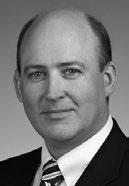
Collins & Lacy Shareholder Chris Adams has been approved as a Cir cuit Court mediator. As an approved neutral, Adams is certified for court appointment in cases utilizing alter native dispute resolution.
Chris will be a valu able resource for case resolution, es pecially in high exposure construction defect matters.”
The South Carolina Bar houses the Supreme Court’s Commission on Al ternative Dispute Resolution (ADR) and related Board of Arbitrator and Mediator certified professionals who aid the Court with all aspects of South Carolina court-annexed ADR.
Robinson Gray adds two associates
Sarah C. Frierson and Clara Elizabeth (“Lizzie”) Weston have joined Robinson Gray as associates.
Frierson’s prac tice with the firm will focus on appel late advocacy, busi ness and commercial litigation, adminis trative and regula tory litigation, and probate and estate litigation.
Frierson graduated from Clemson University in 2016 with a bachelor’s degree in marketing and a minor in economics. She received her Juris Doctor in 2020 from the University of South Carolina School of Law, where
“We’re excited to have Sarah join our growing firm as we move into our new home in the BullStreet devel opment,” said Cal Watson, the law firm’s managing member. “We know she will make a great contribution as a member of our appellate practice group, and of course to our clients needing representation in all her practice areas.”
Weston will be working with Robin son Gray’s Business Team, which repre sents companies and individuals across a range of commercial practice areas. Her practice will be both transactional and litigation-oriented, focused on commer cial disputes, work outs and commercial litigation.
Weston comes to Robinson Gray from the United States Bankruptcy Court in Columbia, where she clerked for the Honorable David R. Duncan, U.S. Bankruptcy Judge for the Dis trict of South Carolina. Before that, she was in private practice in Colum bia for four years.
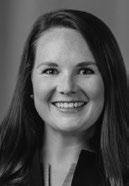

She grew up in Columbia, gradu ating from Heathwood Hall Episcopal School, received her bachelor’s degree in environmental studies from Wash ington and Lee University in 2014, and earned her Juris Doctor degree from the University of South Carolina School of Law in 2017.
Currently, Weston serves on the boards of the Columbia Museum of Art’s Contemporaries Affinity Group
“Lizzie is a great addition to Rob inson Gray and particularly the Busi ness Team here at RG. We’re very pleased to have her practical intelli gence and dedication in the firm, and we know she will bring real value to our clients in the transactional and insolvency area,” Watson said.
Attorney returns to frim as special counsel
Haynsworth Sinkler Boyd, P.A. has welcomed back Suyash S. Rai borde as special counsel.


Raiborde represents governmen tal entities and non-profits in fi nancing large-scale projects through the issuance of various municipal bonds and other obliga tions. Raiborde also advises governmen tal entities on ma jor infrastructure projects, utilizing a variety of project delivery methods including, public-private partner ships, design-build, progressive design-build, design-build-operatemaintain, design-build-finance-op erate-maintain, including related procurement and contract admin istration issues. Additionally, he advises domestic and international companies on various corporate mat ters.
Raiborde was an Associate with Haynsworth Sinkler Boyd from 2016-19. Before rejoining the firm, he worked for a national law firm based in New York City.
He received his Juris Doctor from Emory University and his Bachelor’s Degree from North Greenville Uni versity.
Deep breath: How to be a tech whistleblower
■ BY BILL NETTLES AND GARY JACKSON
As powerful and advanced as tech companies are, they, like oth er organizations, can be laid low by a particular nemesis: the good oldfashioned whistleblower.
Indeed, a thoughtful, well-pre pared whistleblower – as former Twitter security chief Peiter Zatko seems to be — can do more to focus the public’s attention on problems and wrongdoing than legions of well-intentioned press pundits and politicians.
The key is preparedness. David may have brought down Goliath with a simple slingshot, but taking on Big Tech, Pharma, Oil, Govern ment etc. requires more.
Zatko and his devastating rev elations about Twitter are a case in point. According to the former company insider, Twitter mishan dled the personal information of its 400 million users, and not only resisted fixing its problems, but actually employed at least one hos tile foreign agent.
You probably know all this be
cause you’ve seen the explosive headlines. Head-spinning press coverage is a big part of a whistle blower’s power. They make real and provable what the rest of us might have only suspected. And this brings the mighty to account.
But spectacle is a double-edged blade. A whistleblower who enters the arena under-prepared is likely to be sliced, diced and discredited. And when well-meaning but un prepared whistleblowers meet a bad end, society loses.
“Whistle blowing” has a long and celebrated history with some even making it onto the big screen including Karen Silkwood (nucle ar safety), Mark Felt (aka Deep Throat of the Watergate Scandal),
and Frank Serpico (corruption in the NY Police Department).
Given this noble tradition of whistleblowers, our society clearly cannot afford to lose a single one to ill-preparedness. With that in mind, we offer this crash course in how to effectively and decisively blow the whistle:
• It is always best to blow the whistle BEFORE you depart your organization. We know that isn’t always possible as many individu als blow the whistle after they are terminated, but it will be easier to retain documents and other evi dence if you are still employed.
• Ensure that all documents that back up your case are securely stored and maintained. Having ac cess to these documents even after you depart your job will help sup port your case.
It may seem obvious, but con tacting an attorney before you blow the whistle and even before you begin accumulating evidence will help you remain organized and protected against malicious prosecution from your employer. Yes, the organization you’re blow
ing the whistle on will no doubt have skilled lawyers on the pay roll. And those lawyers will likely vigorously defend their client. But the law recognizes the public good of a righteous whistleblower and makes protections available.
“Sunlight,” said U.S. Supreme Court Justice Louis Brandeis, “is said to be the best of disinfectants.” How true. Innumerable wise guys have advised, “Don’t bring a knife to a gun fight.” Also solid.
The ultimate aim of whistle blowing isn’t to merely create a tweet storm. Those are easy to come by. The goal is to right a wrong and make that fix stick.
When lives are at risk, a com pany or its leadership are out of line, or there is clear fraud at work, whistle blowing is one of the noblest acts an employee can do to serve as a check on the power of their employer.
Bill Nettles and Gary Jackson are part of the Carolina Whistle blower Attorneys. They have par ticipated in numerous whistle blower (qui tam) cases in federal and state courts.
SOUTH CAROLINA LAWYERS WEEKLY I October 10, 20222 / NEWS
LAWYERS IN THE NEWS
Bill Nettles Gary Jackson
Chris Adams Clara Elizabeth (“Lizzie”) Weston
Sarah C. Frierson
Suyash S. Raiborde
Teen plaintiffs settle for $10M in UTV rollover
■ BY HEATH HAMACHER
On the eve of “certain trial,” two plaintiffs have settled their negligence claims after a utility terrain vehicle (UTV) crash left one teenager dead and the other seriously injured.
The plaintiffs, one of whom died in the rollover crash, were 14- and 15-year-old girls out on a rural farm property to “enjoy a weekend in the outdoors with friends,” their attorneys said. The plaintiffs were represented by Douglas Jennings and John Dodds IV of Yarborough Applegate in Charleston; John Fulda, Cheryl Perkins, Charles Whetstone, and Amanda Shuler of Whetstone Perkins & Fulda in Columbia; and Ronnie Sabb of Sabb Law Group in Kingstree.
Many of the case’s details, including names of the parties and defense counsel, were withheld pursu ant to a confidentiality agreement.
In an email to Lawyers Weekly, the plaintiff’s at torneys said that the plaintiffs were accompanied by one adult parent—the property owner—the 14-yeardaughter of whom was driving the newly purchased UTV. The children were not given helmets or in structed how to operate the UTV, the attorneys said, and instructions conspicuously marked on the UTV noted that no one under 16 years old should operate the vehicle. Neither the driver nor the passengers were restrained, the attorneys said, and the driver’s seatbelt was buckled and tucked behind the children to bypass the manufacturer’s speed limitation.
The attorneys said that when the UTV rolled over, one of the girls was thrown from the UTV and died at the scene. The other passenger was airlifted
to the hospital with serious injuries.
The injured plaintiff and the estate of the de ceased plaintiff brought separate negligence claims against the teenage driver, her parents, and the LLC that owned the farm and the UTV.
The attorneys said that an important legal is sue in the case was whether the All-Terrain Vehicle Safety Act (also known as Chandler’s Law) applies to UTVs. The act mandates no passengers for chil dren under 16 years old without driver’s licenses, requires helmets and goggles for children 15 and younger, and prohibits those under 16 from operat ing the ATV pursuant to the warning label attached by the manufacturer. Plaintiffs’ attorneys argued that lawmakers intended for the law to apply to UTVs “given technological advancements that have made the popularity of UTVs increase since Chan dler’s Law was passed.”
The attorneys said that the minor defendant’s parents retained a child psychologist in hopes of pre venting their daughter from participating in discov ery and trial, arguing that the participation would cause her undue emotional trauma. Approximately two months before trial, the minor was ordered to undergo an evaluation with a court-appointed psy chiatrist regarding the issue. But the case settled shortly after the order, the plaintiffs’ attorneys said.
The global settlement represented the full policy limits of all liability and umbrella policies insuring the defendants and a $2.1 million contribution by the defendants, the attorneys said. The estate of the deceased plaintiff settled for $7.5 million and $2.5 million was allocated to the surviving plaintiff.
Jennings said that the case dealt with the worst
REPORT
Amount: $10 million
Injuries alleged: Death to one plaintiff and injuries to a second plaintiff
Case name: Withheld
Court: Withheld
Mediator/Judge: Withheld
Date of settlement: August 2022
Insurance carrier: Withheld
Attorneys for plaintiffs: Douglas Jennings and John Dodds IV of Yarborough Applegate in Charleston; John Fulda, Cheryl Perkins, Charles Whetstone, and Amanda Shuler of Whetstone Perkins & Fulda in Columbia; and Ronnie Sabb of Sabb Law Group in Kingstree Attorney(s) for defendant: Withheld
kind of tragedy—the loss of a child.
“There was a lot of anger and grief involved and our clients are pleased the case resolved prior to picking a jury,” Jennings said.
Plaintiffs’ attorneys said that the deceased plain tiff was a stellar student and the “crutch of her fami ly.” She was the primary caregiver of her twin broth er, who has developmental disabilities. She dreamed of becoming a psychiatrist so that she could better care for her brother and treat others with similar disabilities, the attorneys said.
“This young woman had such a positive impact on the world in her short 15 years of life,” Fulda said.
$1.5M settlement for worker injured in dog attack
■ BY HEATH HAMACHER
A worker who was bitten on the job by a large dog has agreed to settle her negligence claim for $1.5 million, her attorneys report.
Hank Burriss and Wayne Ridgeway of Burris & Ridgeway in Columbia report that in May 2018, their client, who was working for a general contrac tor, was sent to work at a residential property man aged by a property management firm. The woman was on the home’s porch when one of two large dogs that were running free “viciously attacked” the woman, scarring and causing nerve damage to her right leg.
The injuries required immediate medical atten tion, and treatment lasted for approximately nine months to treat nerve pain and remediate the scar ring. The plaintiff’s attorneys said that the woman consulted a plastic surgeon and neurologist and was diagnosed with complex regional pain syn drome. Burriss said that his client complied with her medical providers and wanted to get well, but that she suffered from discomfort that could not
permanently be addressed.
“This lady did everything that she could do, both to avoid this injury and mitigate her damages,” Bur riss said. “How ever, relief was not something that came easy.”
Burriss added that the case was resolved after the complaint was filed and that it was more about damages than liability.
“I think the defendant accepted that there was simply no way around the fact that they were liable for the acute injuries that our client suffered,” Bur riss said.
Pursuant to a confidentiality agreement, many of the case’s details, including the names of the par ties and defense counsel, were withheld.
SETTLEMENT REPORT — NEGLIGENCE
Amount: $1.5 million
Injuries alleged:
Case name: Withheld Venue: Saluda County Mediator/Judge: Withheld
Date of settlement: 2022
Special damages: $10,545.91 in past medicals and $536,520 in future medicals
Most helpful experts: Dr. Donen Davis (plastic surgeon), Dr. Marshall White (neurologist), and Cheryl Mathis, CNLCP
Attorneys for plaintiff: Hank Burriss and Wayne Ridgeway of Burriss & Ridgeway in Columbia

Attorney(s) for defendant: Withheld
IHOP trip and fall leads to $1.7M settlement
■ BY HEATH HAMACHER
A woman who tripped and fell over an uneven, raised brick paver at a Mount Pleasant restaurant has settled her personal injury claim for $1.7 mil lion.
The woman, Margot Sapone, fell on March 12, 2019, as she was leaving the IHOP on Highway 17 and was taken to the hospital for immediate treat ment, her attorneys said. Clayton McCullough and Ross Appel of McCullough Khan Appel in Mount Pleasant said that the fall created ongoing back problems that required surgery.
“She had significant complications associated with her oxygen levels following surgery that re quired her to stay in the hospital for longer than an ticipated and subsequent in-patient rehabilitation,” McCullough said. “She continued to have numbness in her legs and trouble walking, even after the sur gery.”
McCullough said that Sapone’s medical bills were approximately $500,000.
Appel said that he is thrilled about the “excellent settlement,” adding that plaintiff uncovered in dis
covery a corporate inspection report, dated approxi mately one year before the inci dent, identifying the raised paver as a “trip toe haz ard.”
“This smokinggun evidence of actual notice prior to the fall was a huge factor in resolving this case on such favorable terms,” Appel said.
McCullough added that the case involved years of discovery and negotiations.
“There were different layers of insurance cover age that were impacted that made the process more complicated,” McCullough said. “We were very hap py with the settlement.”
The defendants were represented by Summers Clarke of Barnwell Whaley in Charleston, among others. Clarke did not immediately respond to a re quest for comment.
Amount: $1.7 million
Injuries alleged: Back injuries requiring surgery
Case name: Margot Sapone v. Majid Farshchi, Class Two Management, IHOP Property, et al.
Court: Charleston County Circuit Court Case No.: 2019-CP-10-3812
Mediator: Richard Hinson of Florence

Date of settlement: July 5
Most helpful experts: Dr. Todd Lansford (treat ing physician) of North Charleston


Attorneys for plaintiff: Clayton McCullough and Ross Appel of McCullough Khan Appel in Mount Pleasant
Attorney for defendant: Summers Clarke of Barnwell Whaley in Charleston, among others
SOUTH CAROLINA LAWYERS WEEKLY I October 10, 2022 VERDICTS & SETTLEMENTS / 3
SETTLEMENT REPORT—PERSONAL INJURY
SETTLEMENT
— NEGLIGENCE
Clayton McCullough Ross Appel
Hank Burriss Wayne Ridgeway
Sharp words, unclear terms from Supreme Court
■ BY KEN BRESLER
Just in time for the U.S. Supreme Court to launch its new term, here are my observations about the court’s legal writing in its flurry of end-ofterm cases about abortion, guns and administrative law.
The decision about abortion that overturned Roe v. Wade was bound to use the word “precedent” repeatedly. But the decision in Dobbs v. Jackson Women’s Health Organization was not bound to use two of my favorite re lated redundancies: “past precedent” and “prior precedent.”
The opinion of the court used “past precedent” and “prior precedent” each twice. The dissenting opinion used “prior precedent” and its variation five times. (Justice Samuel A. Alito Jr. wrote the court’s opinion. The dis senting opinion is jointly ascribed to Justices Stephen G. Breyer, Sonia So tomayor and Elena Kagan.)
Prior precedent? Past precedent? That’s the only kind of precedent there is. See the “pre” in “precedent.” It means “before,” as you know. Prec edents precede
The dissenting opinion in Dobbs used many short and punchy sentenc es, some incomplete.
• “Even in the face of public op position, we uphold the right of indi viduals — yes, including women — to make their own choices and chart their own futures. Or at least, we did once.”
• “For this reason, we do not un derstand the majority’s view that our analogy between the right to an abor tion and the rights to contraception and same-sex marriage shows that we think ‘[t]he Constitution does not per mit the States to regard the destruc tion of a “potential life” as a matter of any significance.’ To the contrary.”
• “But, of course, ‘people’ did not ratify the Fourteenth Amendment. Men did.”
• “Has not the majority insisted for the prior 30 or so pages that the ‘spe cific practice[ ]’ respecting abortion at the time of the Fourteenth Amend ment precludes its recognition as a constitutional right? It has.”
• “Should the audience for these too-much-repeated protestations be duly satisfied? We think not.”
• “… [Planned Parenthood v.] Casey reached the only conclusion possible — that stare decisis operates powerfully here. It still does.”
• “That is about it, as far as we can see. And that is not much.”
• “Nor does it even help just to take the majority at its word. Assume the majority is sincere in saying, for whatever reason, that it will go so far and no further. Scout’s honor.”
In addition to short punchy sen tences, the dissent wrote phrases that don’t typically appear in court deci sions, such as “Scout’s honor.”
• “Mississippi — and other States too — knew exactly what they were doing in ginning up new legal chal lenges to Roe and Casey.”
• “Texas was one of the fistful of States to have recently banned abor tions after six weeks of pregnancy.”
• “The Justices who wrote those words [in Casey] — O’Connor, Ken nedy, and Souter —they were judges of wisdom. They would not have won any contests for the kind of ideologi cal purity some court watchers want Justices to deliver. But if there were awards for Justices who left this Court better than they found it? And who for that reason left this country
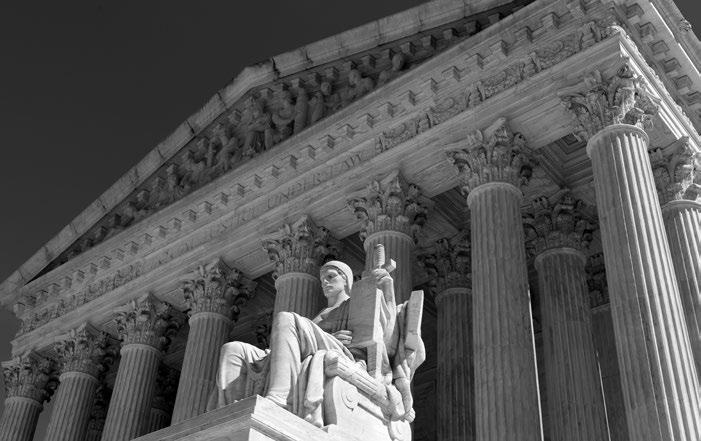
better? And the rule of law stronger? Sign those Justices up.”
That last one might take more than one reading to understand. Sign those justices up for awards? Usually, “sign up” means to “enlist.”
In the New York gun case, Justice Breyer’s dissenting opinion had a ver bal tic going: “the extent to which.”
• “The question before us con cerns the extent to which the Second Amendment prevents democratically elected officials from enacting laws to address the serious problem of gun violence.”
Seven pages later, Breyer para phrased himself:
• “The question presented in this case concerns the extent to which the Second Amendment restricts differ ent States (and the Federal Govern ment) from working out solutions to these problems through democratic processes.”
And finally:
• “[T]he extent to which colonial statutes enacted over 200 years ago were actually enforced … [is] often less than clear.”
Instead of “the extent to which,” the shorter and less stuffy “how much” would have worked.
Justice Kagan continued to be the court’s breeziest writer. She used the trendy “wheelhouse” and “toolbox” in her dissenting opinion in West Vir ginia v. EPA
But some of her writing was a bit awkward. In discussing a series of court precedents, she wrote: “The eyebrow-raise is indeed a consistent presence in these cases … .” Um, she meant, “These cases consistently raised eyebrows”?
Kagan’s breeziness approached sharpness at points. In analyzing whether a situation fit the statutory definition of a “system,” she wrote: “Does that sound like a ‘system’ to you? It does to me too.”
• “On EPA’s view of its own au thority, the majority worries, some fu ture rule might ‘forc[e] coal plants to “shift” away virtually all of their gen eration — i.e., to cease making power altogether.’ But looking at the text of Section 111(d) might here come in handy.”
• “It may be helpful here to quote the full sentence that the majority quotes half of.”
• “Whatever else this Court may know about, it does not have a clue about how to address climate change.”
• “Some years ago, I remarked that ‘[w]e’re all textualists now.’ [Citation omitted.] It seems I was wrong. The current Court is textualist only when being so suits it. When
that method would frustrate broad er goals, special canons like the ‘major questions doctrine’ magically appear as get-out-of-text-free cards.”
I find “get-out-of-text-free cards” more clunky than clever.
In his concurring opinion in the same case, Justice Neil M. Gorsuch intriguingly used a phrase that has not appeared in any other reported judicial decision — and that does not quite make sense. He wrote, “[T]he Constitution does not authorize agen cies to use pen-and-phone regulations as substitutes for laws passed by the people’s representatives.”
Justice Gorsuch used “pen-andphone regulations” without a citation. One can gain context for the phrase from a 2014 article in the Georgetown Law Journal called “A Pen, a Phone, and the U.S. Code”:
“President Obama started this year with a metaphor: ‘I’ve got a pen, and I’ve got a phone,’ the President said. What he meant is that even without action from Congress, he would use executive orders (the pen) and his convening power (the phone) to get things done. Critics of the Ad ministration described the strategy as one of ‘bypass[ing]’ Congress when Congress fails to act.”
So wrote Lisa Heinzerling, one of several writers in and since 2014 who have discussed the phrase “pen and phone.” But no one, until Justice Gorsuch, has used the phrase “penand-phone regulations.” What did he mean?
It is unclear. If a president uses a pen to issue an executive order, that is a regulation. It’s a regulation issued by the White House. And a president using a phone to convene problemsolvers does not constitute issuing a regulation.
What is clear is that Justice Gor such was taking a swipe at former President Barack Obama and label ing some regulations as unauthorized by the U.S. Constitution.
But the phrase means more than unauthorized by statute. It connotes illegitimacy. And it has to do with more than regulations, because the “phone” part of “pen-and-phone regu lations” refers to conferring with pol icy makers, not issuing regulations. I define a pen-and-phone regulation as a “regulation or policy unauthorized by statute, or otherwise illegitimate.”
And that’s the definition that ap pears in my online dictionary (www. ClearWriting.com/dictionary) of terms not in Black’s Law Dictionary.
MLW
Ken Bresler tweets about legal writ ing and new legal terms at @LawWrit ingCoach.
■ PUBLISHER
Liz Irwin lirwin@bridgetowermedia.com
■ INTERIM EDITOR
Jason Thomas
jthomas@scbiznews.com
■ EDITORIAL
Haviland Stewart, Reporter hstewart@nclawyersweekly.com
Scott Baughman, Digital Media Manager sbaughman@mecktimes.com
■ ADVERTISING
Sheila Batie-Jones, Advertising Account Executive sbatie-jones@sclawyersweekly.com
■ ACCOUNTING & ADMINISTRATIVE
Michael McArthur, Business Manager mmcarthur@bridgetowermedia.com
■ CIRCULATION
Disa Ehrler, Audience Development Manager dehrler@bridgetowermedia.com
Circulation: 1-877-615-9536 service@bridgetowermedia.com
■ PRODUCTION & OPERATIONS
Bradley Redmond, Director of Production John Reno, Production Specialist
Corey Edwards, Production Specialist ©2022 BridgeTower Media.
Material published in South Carolina Lawyers Weekly is compiled at substantial expense and is for the sole and exclusive use of purchasers and subscribers. The material may not be republished, resold, recorded, or used in any manner, in whole or in part, without the publisher’s explicit consent. Any infringement will be subject to legal redress.
South Carolina Lawyers Weekly (USPS #020216) is published biweekly every other Monday with General Statewide Circula tion by South Carolina Lawyers Weekly at 130 N. McDowell St. Unit B, Charlotte NC 282042411. (919) 829-9333, (800)-876-5297. Periodi cals postage paid at Charlotte, NC 28228-9998. Subscriptions Rates: $369 per year.
Website: www.sclawyersweekly.com
POSTMASTER: Electronic Service Requested, send address changes to South Carolina Lawyers Weekly, Subscription Services, P.O. Box 1051 Williamsport, PA, 17703-9940
service@bridgetowermedia.com
South Carolina Lawyers Weekly is a publication of BridgeTower Media, 222 South Ninth Street, Suite 900, Minneapolis, MN 55402.
SOUTH CAROLINA LAWYERS WEEKLY I October 10, 2022
"Helping lawyers practice better, more efficiently, and more profitably."
4 / COMMENTARY
The U.S. Supreme Court’s opinion overturning Roe v. Wade used variants of the word precedent, which may not have been grammatically correct. Photo/Associated Press
Greer wants to be a destination spot — here’s how
■ BY JASON THOMAS jthomas@scbiznews.com
Greer has rebranded its parks and recreation department with the addition of a tourism division to capi talize on its rising popularity and to draw more visitors.
The Parks & Recreation Depart ment is now the Parks, Recreation, & Tourism Department, and a new website — DiscoverGreer.com — serves as a one-stop shop for tourism information and for promoting Greer as a destination spot.
“Tourism depends on attractions … public parks are often the engine that drives tourism in many commu nities and are responsible for much of the economic impact. They are central to tourism,” Ann Cunning ham, director of Parks, Recreation & Tourism, said at a news conference. “Changing our name to include tour ism reflects our continued growth in the city.”
As part of the rebranding, the city promoted Lindsey Shaffer to serve as its tourism specialist. Shaffer is the former events coordinator with the city’s parks and recreation depart ment.
Greer’s redevelopment has caught the attention of media outlets across the country, including Thrillist, which recently named the city one of the “best suburban neighborhoods you should totally move to.”
“The city has been on an incredi ble growth spurt in the last 20 years, and along with that comes things that have helped bring us to the fore
front of attention, particularly in the Upstate,” Mayor Rick Danner said during the news conference. “There are a lot of things going on that we want to make sure that everybody knows are available and that we are prepared to deal with in terms of not only our citizens but those that want to visit the Upstate and those that are coming here and making a deci sion about where they want to move
or live.”
Danner highlighted Greer’s prox imity to golf courses, lakes and parks, with the crown jewel being “an award-winning downtown that I now know from several awards that we won is being referred to as the criss-cross light city in South Caro lina,” he said, referring to the lights strung above its streets.
“We have become a destination in
downtown.”
The revitalization efforts of down town and the Trade Street area rep resent an investment of nearly $20 million, according to Danner, which he says has generated $200 million in return investment.
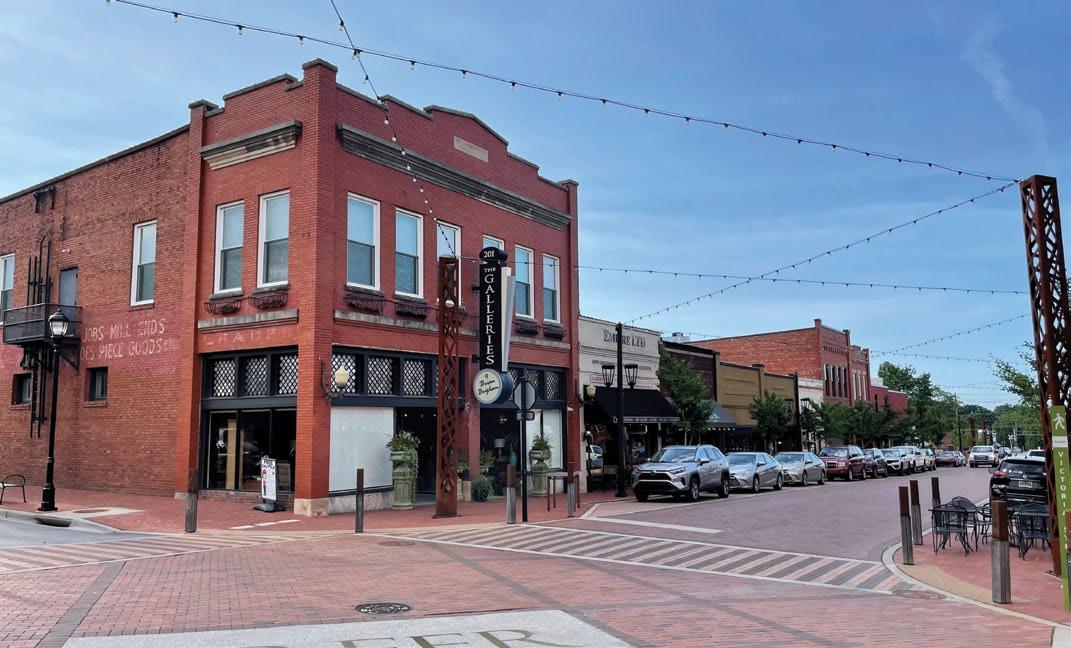
“We think that speaks pretty highly of what we’ve done,” Danner said, “and what we are continuing to do.”
Automation the future with $100M BMW expansion
■ BY ROSS NORTON rnorton@scbiznews.com
On the eve of the 30th anniversary of the groundbreaking ceremony that signaled the arrival of BMW Manu facturing, the company last week added two private bridges and nearly 1 million square feet of floor space to its ever-expanding Upstate footprint.
The company officially opened LCX, a logistics center on Freeman Farm Road in Greer that BMW bills as a “more efficient, sustainable and digital operation.”

The $100 million facility was con structed by Becknell Industrial. It includes two private bridges that con nect LCX to the manufacturing plant, where parts are transported by cross ing Freeman Farm Road and Inter state 85.
BMW Manufacturing President and CEO Robert Engelhorn said LCX combines two warehouses into one fa cility, “making our processes faster, leaner and more efficient.” He said the center incorporates elements of the BMW iFactory strategy, which defines the future of automotive man ufacturing for all of BMW production worldwide.
A feature of the logistics center is a fence that cuts through the inte rior of the building, separating the new container freight station from BMW’s Foreign Trade Zone. Parts en ter the warehouse on one side to be separated. The duty-paid material is cross-docked and travels by truck to BMW’s Consolidated Services opera tions at Inland Port Greer, according to a BMW news release.
Only the duty-unpaid BMW Manu
facturing-owned parts are allowed to enter the Foreign Trade Zone. Those parts are either stored on racks tem porarily in the warehouse or go direct ly to the BMW plant to be used in pro duction. Driverless yard trucks called “holsters” carry the parts across the bridges built by United Infrastruc ture Group. The one over Interstate 85 is one of the longest free-spanning bridges in the state, according to the news release.
“BMW has worked in close part nership with U.S. Customs and Bor der Protection and appreciates their support in creating this one-of-a-kind
warehouse,” Oliver Bilstein, vice president of Logistics and Production Control, said. At the ceremony, Bil stein said the effort required every one involved to overcome challenges induced by COVID-19 — including supply shortages and the rising cost of building materials — but the proj ect was still completed on time.
Spartanburg County Councilmem ber David Britt, who was first elected shortly before BMW chose Greer for its only U.S. plant, said the new fa cility, like everything at the site since 1992, is a result of partnerships.
“This investment in itself is a mile
stone of collaboration,” said Britt, also the longtime chairman of the county’s economic development committee.
Since 1992, BMW has invested nearly $12 billion in the Spartanburg County plant, Engelhorn said before cutting a ribbon to officially open the LCX.
A video of the holsters at work showed the tractor-trailer sized vehi cles at work. When BMW launches its autonomous logistics program in the future, it will use 5G wireless technol ogy on the Plant Spartanburg site, en abling real-time connectivity between machinery and equipment.
SOUTH CAROLINA LAWYERS WEEKLY I October 10, 20226 / NEWS
The city of Greer has rebranded and launched a tourism division to capitalize on its rising popularity and millions in redevelop ment efforts, and to draw visitors from across South Carolina and the United States. Photo/City of Greer
BMW Manufacturing’s new $100 million logistics center is being billed as a ‘more efficient, sustainable and digital operation,’ and will feature automated trucks transporting goods from BMW Operations to Inland Port Greer. Photo/Ross Norton
its headquarters in Indianapolis.
The Charlotte event, marking the 71st Annual NALS Conference, wel comed 105 attendees, 10 exhibitors and 25 speakers, said membership director Mark Lewis.
He credits the work of the chapters for keeping NALS strong over the years and for the success of confer ences like the one in Charlotte.
“Chapters help drive membership, and we know success starts at the lo cal level,” he said.
The South Carolina Chapter has been a part of NALS for 57 years.
Starting in 1958, South Carolina was home to local legal secretaries’ associations in Columbia and Green
/ NALS chapters join for event
ville. Chapters followed close behind in Charleston and York.
“These four chapters formed the South Carolina Association of Legal Secretaries in 1965 when they passed resolutions to affiliate with NALS,” Helms said. “The association became known as Legal Staff Professionals of South Carolina in 1998.”
Today, LSPSC has 100 members, some who belong to five local chapters in Charleston, Hilton Head, Orange burg, Columbia and Greenville, and others who are members at large.
The North Carolina NALS Chap ter launched this year, said presi dent Alma Friedrich, a paralegal with Poyner Spruill of Raleigh. In 10 months, the organization has grown to 35 members.
“We have hosted continuing legal education programs, held in-person networking events, and attained accreditation from the North Caro lina State Bar Paralegal Division for continuing paralegal education, and recently published our chapter web site,” Friedrich said.
Friedrich added that having the NALS conference in North Carolina was even more special because it co incided with the new chapter’s for mation. She attended along with the chapter vice president Joan O’Neal.
“What struck me the most was the passion for the legal profession every one in attendance displayed, genuine care to help each other succeed, and deep friendships demonstrated by NALS members to one another from
across the country,” she said.
Both associations hope having the national conference in Charlotte will help spur growth and inspire mem bers to continue staying engaged with each other and to invite their col leagues to join.
Helms plans to focus on student re cruitment in the months ahead.
“With many seasoned profession als retiring, we are looking toward the future of the legal field and our associations,” she said. “I believe that future lies in our student members, and my goal this year is to engage schools with legal/paralegal degree programs.”
Next year’s NALS Legal Education Conference will be held in Houston, Texas.
FORD / Court rules against Ford in groundbreaking case

wrongful death claim.
ing the driver’s face to hit the gearshift lever. Initially, she pre vailed in a 2016 trial in which ju rors awarded $4.65 million despite deciding that the decedent bore 30 percent responsibility.

However, the auto giant ap pealed the matter, and the wrong ful death portion of the judgment, which comprised a majority of the award, was ultimately thrown out by the Fourth Circuit based on clarifications by the South Caro lina Supreme Court. The state’s high court indicated that there was no presumption that death by suicide is unforeseeable as a mat ter of law however its response prompted the Fourth Circuit to find that the district court did not apply the proper proximate cause framework to the case when it in structed the jury.
Still, the appellate ruling left intact the $1.9-million verdict on Wickersham’s survivorship claim. Moreover, the district court reject ed the automaker’s assertion that the plaintiff showed no evidence that Wickersham’s taking his own life was something that the com pany could have envisaged as a result of the airbag problem and denied its motion for judgement on the issue as a matter of law.
“Contrary to Ford’s contention,” wrote Judge David Norton, “the court does not find it a far stretch
for a jury to conclude that suicide was a specifically foreseeable con sequence of a defectively deployed airbag when presented with evi dence that airbags commonly re sult in facial injuries like Wicker sham’s, that those injuries cause severe chronic pain, and that se vere chronic pain is directly linked to suicidal ideation and suicide.”
Now, the two parties return to court for a renewed fight over the
“It is kind of an oddly postured case,” said Crosby. “There is a finding that the product is defec tive and that it caused his inju ries. It is just whether or not it is causally related to the suicide.”
He said expert testimony and medical records have created an especially strong evidence chain for jurors to follow which may have been lacking in the hand ful of previous matters in South Carolina which attempted similar arguments linking suicide to inju ries from a defective product.
“All the cases that preceded it were thrown out by a court before they ever got to a jury,” he said.
Crosby said that he’s optimistic about the matter which he said had already succeeded once in front of a jury.
“It is like anything else,” he said. “There are no guarantees but I feel good about it.”
Crosby listed J. Kenneth Cart er, Jr. of Turner Padget Law as representing the defense. Neither Carter nor Ford’s media relations contact returned a call requesting comment for this story.
Fear of Missing Out?
SOUTH CAROLINA LAWYERS WEEKLY I October 10, 2022 NEWS / 7
A district court has affirmed that a woman whose husband killed himself related to an automobile accident will recover a seven-figure settlement against Ford Motor Co., while another part of the groundbreaking suit heads to trail. Photo/Associated Press
Continued from 1 ► Continued from 1 ► COLLABORATION
It is kind of an oddly postured case. There is a finding that the product is defective and that it caused his injuries. It is just whether or not it is causally related to the suicide.
Ronnie Crosby, Parker Law Group
Free email newsletters: Sign up now at sclawyersweekly.com/subscribe
Cure work FOMO with a daily dose of news! South Carolina Lawyers Weekly will keep you up-to-date and on the leading edge of information when you sign up for our daily newsletters. You’ll always know the latest legal news with our daily email newsletters. Court opinions and digests, news from the courts and more will keep you among the best informed - so you can be effective! Keeping tabs on the success of colleagues — and competitors — will be a snap with our event notifications • Round-the-clock website access keeps digital content at your fingertips, whenever and wherever you need it.
Opinions
Civil Rights
Search & Seizure – Arrest Warrant –Probable Cause – Security Footage
At the time Officer Scott Hill sought a warrant for defendant’s arrest, Hill knew that tobacco prod ucts were kept behind the counter of a convenience store. When watch ing the store’s security footage, Hill saw the perpetrator climb over the counter to steal tobacco products. While police were on the scene, the store manager discovered and alerted officers to a tobacco product that contained dried blood; foren sic testing indicated that the blood matched plaintiff. These facts, within Hill’s knowledge, were suf ficient to warrant a prudent person, or one of reasonable caution, in be lieving that plaintiff had committed the burglary.
We affirm summary judgment for defendants.
MacDonald v. Anderson County Sheriff’s Office (Lawyers Weekly No. 003-039-22, 7 pp.) (Per Curiam) No. 21-6225. Appealed from USDC at Anderson, S.C. (Henry Herlong, S.J.) Donald Smith for appellant; Steven Pruitt for appellees. 4th Cir. Unpub.
Insurance
Auto – UM – Shooting – Causal Con nection – Independent Act
Where the driver of one vehicle shot and killed the driver of another vehicle, the injury was not foresee ably identifiable with the normal use of the shooter’s vehicle; further more, the shooting was an indepen dent act which broke any chain of causation.
We reverse the Court of Appeals’ decision, which overturned the cir cuit court’s ruling in favor of the plaintiff-insurer.
To recover under an automobile insurance policy, the insured’s dam ages must “arise out of the owner ship, maintenance, or use” of the uninsured motor vehicle. S.C. Code Ann. § 38-77-140. A three-prong test is used to determine whether an insured meets that requirement: (1) the party seeking coverage must establish a causal connection be tween the injury and the uninsured vehicle, (2) there is no act of inde pendent significance which breaks the chain of causation, and (3) the uninsured vehicle must have been used for transportation at the time.
State Farm Fire & Casualty Com pany v. Aytes, 332 S.C. 30, 503 S.E.2d 744 (1998). Under the first prong, the insured must also show three subparts: “a) the vehicle was an ‘active accessory’ to the assault; and b) something less than proxi mate cause but more than mere site of the injury; and c) that the ‘injury must be foreseeably identifi able with the normal use of the au
tomobile.’” State Farm Mut. Auto. Ins. Co. v. Bookert, 337 S.C. 291, 523 S.E.2d 181 (1999). The parties agree the shooter’s vehicle was be ing used for transportation at the time, so the inquiry focuses on the three subparts under the first ele ment, and whether the act of firing a rifle breaks the chain of causation.
Whether coverage exists in a shooting involving a vehicle has evolved in our jurisprudence. There has been no appellate decision al lowing coverage where injuries arose from a gunshot wound since Home Insurance Company v. Towe, 314 S.C. 105, 441 S.E.2d 825 (1994), that is, until the Court of Appeals’ decision in this case. In reversing the circuit court and finding cover age here, the Court of Appeals relied on cases nearly 30 years old which, though not explicitly overruled, were sharply limited by Aytes and the new framework it established.
We agree with other courts that have held it is not reasonable to conclude that the parties to an in surance contract intended gunshot injuries to be covered by an automo bile insurance policy.
Moreover, even if defendant could satisfy the first Aytes factor, she fails on the second one because the act of firing a weapon into an other vehicle constitutes an act of independent significance. Shoot ing from a vehicle at other persons is not an act inextricably linked to the use of a vehicle. Consequently, under either of the first two factors, defendant cannot establish that her decedent’s injuries arose out of the use of the shooter’s motor vehicle— a position consistent with courts across the country.
Reversed.
Progressive Direct Insurance Co. v. Groves (Lawyers Weekly No. 010-039-22, 8 pp.) (Kaye Hearn, J.) (Donald Beatty, C.J., concur ring in result only without separate opinion) Appealed from Dorchester County Circuit Court (Alison Re nee Lee, J.) On writ of certiorari to the Court of Appeals. John Robert Murphy and Wesley Brian Sawyer for petitioners; John Phillips Linton and Ryan Harris Sigal for respon dent. S.C. S. Ct.
Criminal Practice
PPPA – Defense of Another – Circuit Court’s Role – Fault
Petitioner shot and killed a guest who was striking petition er’s partner, Randy Wilson. There was a question as to whether Wil son was without fault in bringing on the difficulty. When petitioner sought immunity under the Pro tection of Persons and Property Act, this question was for the cir cuit court – and not a jury – to de termine.
We reverse the Court of Ap peals’ decision, which upheld the circuit court’s denial of petitioner’s
motion for immunity.
The decedent was at the home of petitioner and Wilson to visit his brother, Jacob Kirk, who lived with the couple rent-free in exchange for helping Wilson, who had health problems. The decedent and Kirk were drunk, and Wilson had also consumed alcohol.
There was a question as to whether Wilson knocked over the decedent’s beers intentionally or accidentally. The decedent was an gered by Wilson’s actions and be gan striking Wilson. There was no conflict in the evidence that Wil son was attempting to go from the porch to the inside of the residence but that the decedent was prevent ing him from doing so.
The circuit court did not have the benefit of recent decisions of this court when it stated, “Despite the general consensus regarding the basic facts, there was some dispute as to the cause and nature of the argument between Wilson, Kirk, and [the decedent].” The circuit court concluded petitioner failed to meet his burden of show ing that he had the right to act in defense of another “because he did not prove that Wilson was without fault in bringing about the diffi culty.”
This court has since clarified that a conflict in the evidence does not automatically warrant the denial of immunity. Rather, the circuit court must sit as the factfinder in the first instance, weigh the evidence and make its own credibility and factual findings be fore reaching a decision as to im munity.
We note that, even if an individ ual was initially at fault in bring ing on the difficulty, the right to self-defense may be restored under some circumstances. The circuit court appeared to conclude peti tioner had failed to meet his bur den of showing Wilson was not at fault in bringing on the difficulty because the evidence in this regard was conflicting and, therefore, pre sented a “quintessential jury ques tion,” relying on precedent which we have since clarified.
Petitioner correctly argues that the circuit court committed an er ror of law in ruling on the motion for immunity because it abdicated its role as the fact-finder by ruling a jury, not the court, must decide whether the individual petitioner was defending was without fault in bringing on the difficulty.
Reversed and remanded.
State v. McCarty (Lawyers Weekly No. 010-040-22, 16 pp.) (Donald Beatty, C.J.) Appealed from Pickens County Circuit Court (Letitia Verdin, J.) On writ of cer tiorari to the Court of Appeals. Su san Barber Hackett for petitioner; Alan McCrory Wilson, Donald Zelenka, Melody Jane Brown, Mi chael Ross, Julianna Battenfield and William Walter Wilkins for re spondent. S.C. S. Ct.
Tort/Negligence
Rape Kit Collection – Civil Practice –Motion to Amend – Intentional Inflic tion of Emotional Distress
Where plaintiff alleges that de fendants’ hospital employees neg ligently collected sexual assault evidence, resulting in the closure of a criminal case in Georgia, the circuit court abused its discretion when it dismissed plaintiff’s negli gence claims with prejudice without allowing plaintiff an opportunity to amend her complaint.
We reverse and remand the cir cuit court’s dismissal of plaintiff’s negligence claims. We affirm the dismissal of plaintiff’s claim of in tentional infliction of emotional dis tress (IIED).
Even assuming the complaint failed to allege facts sufficient to state a claim for negligence, plain tiff requested leave to amend her complaint immediately prior to and during the hearing on respon dents’ motion to dismiss and stated she sought to further clarify her claims for negligence. We cannot determine whether the amendment would be clearly futile because the circuit court dismissed plaintiff’s complaint with prejudice without first giving her an opportunity to submit a proposed amended com plaint. Further, nothing in the re cord suggests respondents would have suffered prejudice if plaintiff were permitted to amend her com plaint.
The circuit court abused its dis cretion by failing to allow plaintiff an opportunity to amend her com plaint.
As to plaintiff’s IIED claim, the circuit court erred in applying a higher burden of proof for an in tentional infliction of emotional distress claim at the 12(b)(6) stage. In addition, we question whether the circuit court’s conclusion that respondents were entitled to immu nity under the Tort Claims Act was proper at that stage.
Nevertheless, we affirm the cir cuit court’s dismissal of this claim because plaintiff failed to allege facts to suggest that the employ ees, by following the instructions of law enforcement to give her the examination kit, intended to inflict or recklessly inflicted severe emo tional distress upon plaintiff. Plain tiff’s allegations were insufficient to support a claim that hospital em ployees “intentionally or recklessly inflicted severe emotional distress” or that they “were certain or sub stantially certain that such distress would result from their conduct.” Plaintiff did not seek to amend her complaint as to this claim, and we cannot conceive of an amendment to this cause of action that would not be futile.
SOUTH CAROLINA LAWYERS WEEKLY I October 10, 20228 / OPINION DIGESTS
Affirmed in part, reversed in part
See Page 9 ►
remanded.
Doe v. Oconee Memorial Hospital (Lawyers Weekly No. 011-062-22, 9 pp.) (James Lockemy, A.J.) Ap pealed from Oconee County Circuit Court (Scott Sprouse, J.) Courtney Celeste Atkinson and Hannah Rog ers Metcalfe for appellant; Kenneth Norman Shaw for respondents. S.C. App.
Criminal Practice
PCR – Ineffective Assistance Claim – Witness Recantation – Accident Instruction – Firearm Possession
Although a prosecution witness later recanted his statement that petitioner had shot the victim, since (1) petitioner admitted that he shot the victim but claimed it was an accident, (2) petitioner argued he could have gotten a jury instruction on accident because his gun was in his pants – rather than in his hand – when he got out of the car, and (3) the witness’s new statement was that the shooter was holding a long gun when he got out of the car, even if plea counsel had interviewed the prosecution witness, there is little reason to believe that counsel’s ad vice would have changed based on the witness’s recantation. Even the element of the witness’s new state ment that could have helped peti tioner’s potential accident strategy at trial – the suggestion that the in dividual from the car “was backing up trying to get back into the car” – is not enough to undermine confi dence in the outcome.
We affirm the denial of post-con viction relief.
It is true that the undisputed tes timony of a petitioner that he would not have pleaded guilty can, on its own, form the basis for a finding of prejudice. However, such testimony is not always enough to fulfill the prejudice prong of a claim of inef fective assistance of counsel. More over, such testimony can be out weighed by other evidence.
Nor is it determinative that plea counsel expressed some misgivings about his advice. We review for prejudice under an objective stan dard.
Rivers v. State (Lawyers Weekly No. 012-025-22, 8 pp.) (Per Curiam) Appealed from Chesterfield County Circuit Court (Roger Henderson, J.) Taylor Davis Gilliam for petitioner; Alan McCrory Wilson and Chelsey Faith Marto for respondent. S.C. App. Unpub.
Criminal Practice
Standard of Review
In the past, reviewing only a cold record led us to apply the def erential “any evidence” standard in Fourth Amendment cases. Now that we review some of the same evidence as the trial court – such as body and dashcam footage – it is no longer necessary for us to defer to the trial court’s overall ruling in ev ery case. Accordingly, appellate re view of a motion to suppress based on the Fourth Amendment involves a two-step analysis: we review the trial court’s factual findings for any evidentiary support, but the ulti mate legal conclusion – in this case whether reasonable suspicion exists – is a question of law subject to de novo review.
Extended Stop
Detectives saw defendant (1) disembark from a bus which had originated in New York, (2) scan a parking lot before entering it, and (3) get in a car with an inoperable third brake light. Detectives asked a patrol officer to stop the car for the brake-light violation. They told the officer defendant was suspi cious, but they did not specify why.
The officer gave the driver a warning ticket and then asked her to get out of the car. She complied and consented to a search of the car. The state argues that this ex tension of the traffic stop was justi fied based on several facts: (1) the officer had to repeatedly ask where the couple were traveling from be fore the driver answered that she had picked defendant up from the bus stop, (2) the driver’s pants were unzipped and (3) defendant was sweating and appeared nervous. However, the officer did not see any items that would demonstrate po tential criminal activity before de ciding to extent the stop.
It is apparent that this was a drug stop masquerading as a traffic encounter. Indeed, the officer can be heard telling dispatch that the goal of the stop was to “try to obtain con sent.” While we do not suggest that pretextual stops are illegal, in order to prolong the stop, there must be an objective basis for concluding that criminal activity may be afoot. The state failed to meet this burden.
Pat-Down
Video evidence shows that de fendant stepped out of the vehicle at the direction of an officer, with a second officer standing beside him. Once defendant began to place his hands in his pockets, an officer un derstandably told defendant to re move them. In response, defendant raised his hands over his head and began to turn.
petitioner; Alan McCrory Wilson, Mark Reynolds Farthing and Scar lett Anne Wilson for respondents. S.C. S. Ct.
Criminal Practice
Resisting Arrest – Failure to Pay Bar Tab – Ejection – Officer’s Record
Where bouncers were attempting to eject defendant, and where bar employees informed a police officer that defendant had refused to pay his tab and was refusing to leave, the officer had probable cause to arrest defendant for defrauding a public accommodation.
We affirm defendant’s conviction for resisting arrest.
While S.C. Code Ann. § 45-150(B) refers to absconding without payment, we reject defendant’s ar gument that, because he did not willingly leave the bar, he did not violate the statute. Interpreting the statute to address only a willing ex ist – and not the forced ejection of an uncooperative patron refusing to pay – would achieve an absurd re sult the Legislature could not pos sibly have intended.
Defendant’s refusal to pay—fol lowed by his refusal to leave and his scuffle with the bouncers as he was shown the door—provided the probable cause necessary for the responding officers to arrest him not only for the violation of § 45-150, but also for disorderly conduct. Thus, the circuit court did not err in denying defendant’s motion to sup press evidence obtained pursuant to his lawful arrest.
The arresting officer was disci plined in 2016 for attempting to search an individual in Marion Square without cause; however, the circumstances surrounding that search in a dissimilar situation are not relevant here because they do not make it more or less likely that the officer had (or lacked) probable cause for the arrest and search of defendant outside the Silver Dollar bar.
The circuit court properly found admission of the prior disciplinary matter was not relevant and would be highly prejudicial and likely mis leading to the jury regarding the objective probable cause standard. Moreover, as the circuit court rec ognized, the personnel files contain
no record probative of the officer’s truthfulness or untruthfulness. Ac cordingly, the circuit court did not abuse its discretion in denying de fendant’s motion to compel the per sonnel file and in declining to allow defendant to question the officer about the prior incident.
Affirmed.
State v. Davis (Lawyers Weekly No. 011-063-22, 11 pp.) (Stepha nie McDonald, J.) Appealed from Charleston County Circuit Court (Markley Dennis & Jennifer Mc Coy, JJ.) Wanda Carter and Adam Sinclair Ruffin for appellant; Alan McCrory Wilson, William Blitch and Scarlett Anne Wilson for re spondent. S.C. App.
Insurance
Life – Revocation upon Divorce Stat ute – Retroactive Application – First Impression
Even though defendant and the decedent were divorced before the enactment of S.C. Code Ann. § 622-507, since the decedent died after the statute’s enactment, the statute applies to revoke his designation of defendant as the beneficiary of his life insurance policy.
We reverse summary judgment for defendant.
Section 62-2-507(c)(1)(i) says a “divorce . . . revokes any revocable . . . beneficiary designation made by a divorced individual to the di vorced individual’s former spouse in a governing instrument,” “[e] xcept as provided by the express terms of a governing instrument, a court order, or a contract relating to the division of the marital estate made between the divorced individ uals before or after the marriage[] [or] divorce.” Section 62-2-507(a) (4) defines a governing instrument as “an instrument executed by the divorced individual before the di vorce. . . [from] the individual’s former spouse including, but not limited to wills, revocable inter vi vos trusts, powers of attorney, life insurance beneficiary designations, annuity beneficiary designations, retirement plan beneficiary desig nations and transfer on death ac counts.”
See Page 10 ►
Police did not have reasonable suspicion to justify the extension of a traffic stop based on (1) defen dant’s arrival on a bus from New York, (2) his scanning of a parking lot, (3) his driver’s pants being un zipped, and (4) nervous behavior.
We reverse the Court of Appeals’ decision, which upheld the trial court’s denial of defendant’s motion to suppress the cocaine found on his person and in the car in which he was a passenger.
An officer testified it was defen dant’s conduct that indicated he consented to a search, but it is clear from the video that defendant only placed his hands on the vehicle at the direction of the officer. Indeed, after asking whether defendant had any weapons on him, the officer asked defendant to “put his hands up on the car for me.” Because de fendant’s conduct was at the direc tion of the officer, it was not a vol untary decision to allow the officer to search him. Thus, the state failed to prove that defendant voluntarily consented.
Reversed.
State v. Frasier (Lawyers Week ly No. 010-041-22, 11 pp.) (Kaye Hearn, J.) Appealed from Charles ton County Circuit Court (Deadra Jefferson, J.) Kathrine Hudgins for
SOUTH CAROLINA LAWYERS WEEKLY I October 10, 2022 OPINION DIGESTS / 9 STATEMENT OF OWNERSHIP, MANAGEMENT AND CIRCULATION South Carolina Lawyers Weekly; Publication number 020-216; Complete Mailing Address of Known Office of Publication: 130 N. McDowell St., Unit B, Charlotte, NC 28204; the mailing address of Headquarters or General Business Offices of the Publisher (Not printer), South Carolina Lawyers Weekly, 130 N. McDowell St., Unit B, Charlotte, NC 28204; Full Names and Complete Mailing Addresses of Publisher, Editor, and Managing Editor: Publisher – Liz Irwin, 130 N. McDowell St., Unit B, Charlotte, NC 28204; Editor – Jason Thomas, 130 N. McDowell St., Unit B, Charlotte, NC 28204; Managing Editor – None. South Carolina Lawyers Weekly is owned by BridgeTower OPCo, LLC (OpCo), 100 N Pacific Coast Hwy., Ste 1725, El Segundo, CA 90245. Known Bondholders, Mortgagees, and Other Security Holders Owning or Holding 1 Percent or More of Total Amount of Bonds, Mortgages, or Other Securities, Cerberus Business Finance Agency, 11812 San Vicente Blvd, Suite 300, Los Angeles, CA 90049. Issue Date for Circulation Data Below, August 29, 2022; the average number of copies of each issue during the preceding 12 months Box 15 is: (A) total copies printed 555; (B1) Paid Outside-County Mail Subscriptions 446; (B2) Paid In-County Subscriptions: 0; (B3) Sales through dealers and carriers, street vendors, counter sales: 0. (B4) Other classes mailed USPS: 2; (C) Total Paid Circulation: 448; (D1) Free Distribution by mail, samples complimentary and other free copies: 27; (D2) In-county free distribution: 0; (D3) Other classes mailed Free Distribution: 0; (D4) Free distribution outside the mail: 30; (E) Total Free distribution: 57; (F) Total Distribution: 505; (G) Copies not Distributed: 50; (H) Total: 555; (I) Percent of Paid: 88.71%. The actual number of copies of a single issue published nearest to the filing date is: (A) Total number of copies printed 574; (B1) Paid Outside-County Mail Subscriptions: 465; (B2) Paid In-County Subscriptions: 0; (B3) Sales through dealers and carriers, street vendors, counter sales: 0; (B4) Other classes mailed USPS: 2; (C) Total Paid Circulation: 467; (D1) Free Distribution by mail, samples compli mentary and other free copies: 27; (D2) In county free distribution: 0; (D3) Other classes mailed Free Distribution: 0; (D4) Free distri bution outside the mail: 30; (E) Total Free distribution: 57; (F) Total Distribution: 524; (G) Copies not Distributed: 50; (H) Total: 574 (I) Percent of Paid: 89.12% Electronic Copy Circulation; The Average number of copies in the last 12 months was: (16A) Paid Electronic Copies, 31; (B) The Average Paid Print and Paid Digital Copies were 479; (16C) The Average Total Print and Paid Digital Distribution was 536; (16D) Percent Paid of Both Print & Paid Digital was 89.36%. Electronic Copy Circulation; The Actual Number of Copies of a Single Issue (16A) Paid Electronic Copies, 35; (16B) The Average Paid Print and Paid Digital Copies were 502; (16C) The Average Total Print and Paid Digital Distribution was 559; (16D) Percent Paid of Both Print & Paid Digital was 89.80%. I certify that all information furnished on this form is true and complete: (Signed) Liz Irwin, Publisher REQUIRED BY TITLE 39 U.S.C. 3685 STATEMENT SHOWING OWNERSHIP, MANAGEMENT AND CIRCULATION OF South Carolina Lawyers Bi-Weekly, publication number 020-216, filed October 1, 2022, Published Weekly, 26 issues per year, $369.00 annually at 130 N. McDowell St., Unit B, Charlotte, NC 28204. The General Business offices of the Publishers are at 130 N. McDowell St., Unit B, Charlotte, NC 28204. and
Search & Seizure – Extended Traffic Stop – Standard of Review – Reason able Suspicion – Pat-Down – Lack of Consent
Continued from 8 ►
South Carolina Act Number 100 of 2013 (the Act) indicated it took ef fect on January 1, 2014, and on that date, unless otherwise provided in the Act, “any rule of construction or presumption provided in this act applies to governing instruments executed before the effective date of the act unless there is a clear in dication of a contrary intent in the terms of the governing instrument,” subject to certain provisions.
A state may pass retrospective laws absent direct constitutional prohibition. In the construction of statutes, there is a presumption that statutory enactments are to be considered prospective rather than retroactive in their operation unless there is a specific provision or clear legislative intent to the contrary. Remedial or procedural statutes are generally held to operate retrospec tively. However, no statute will be applied retroactively unless that result is so clearly compelled as to leave no room for reasonable doubt.
This case is the first time a South Carolina appellate court has exam ined amended § 62-2-507. The fed eral district court for South Caroli na has considered the statute twice and has reached different conclu sions.
After a review of case law from other jurisdictions, we find the South Carolina version of the re vocation-upon-divorce statute, § 62-2-507, applies and revokes the decedent’s designation of defendant as the beneficiary of his life insur ance policy, despite the fact that their divorce occurred before the enactment of the 2013 amendment to the statute. Based on our read ing of the South Carolina statute, which is supported by other states’ reading of their versions of the stat ute, because the decedent’s death occurred after the date the amend ment took effect, the statute applies and revokes the designation. Fur ther, defendant had no vested in terest in the policy until such time as the decedent died. Accordingly, § 62-2-507 applies here to revoke the decedent’s designation of defendant as beneficiary of his life insurance policy.
Reversed.
Meier v. Burnsed (Lawyers Weekly No. 011-064-22, 24 pp.) (Aphrodite Konduros, J.) Appealed from Beaufort County Circuit Court (Marvin Dukes, Special Judge) Fred Kuhn for appellants; Peggy McMil lan Infinger, Paul Infinger and James Richardson for respondent. S.C. App.
Insurance
Uninsured Motorist Coverage –Shooting Death – Independent Act
Discharging a firearm into anoth er vehicle constituted an independent act that severed any connection to the use of motor vehicles and therefore ended coverage under auto insurance policies.
We reversed the court of appeal’s judgment overturning the grant of summary judgment to an insurer seeking to disclaim coverage for gun shot injuries that occurred while the victim’s and shooter’s vehicles were stopped at a red light.
Jimi Redman shot and killed Lynn Harrison while both of their vehicles were waiting at a red light. Prior to the shooting, Redman approached
Harrison’s vehicle in the lane to Har rison’s right. Witnesses saw Redman make hand gestures and blow kisses toward Harrison. Harrison made no attempt to evade Redman. However, when both vehicles stopped at the light, Redman pulled out a rife and fired at Harrison through her passen ger window.
Harrison was insured by an auto insurance policy issued by USAA and by her husband’s motorcycle policy is sued by Progressive. The Progressive policy included uninsured motorist coverage that would pay benefits for bodily injury sustained in an accident “arising out of the ownership, main tenance or use of an uninsured motor vehicle.” The USAA policy also in cluded uninsured motorist coverage that was available for bodily injury or injury to or destruction of property arising from the ownership, mainte nance or use of an uninsured motor vehicle.
Progressive filed the present de claratory judgment complaint seek ing a ruling that it had no obliga tion to provide uninsured motorist coverage because Harrison’s fatal injuries did not arise from the use of Redman’s vehicle. The parties crossmoved for summary judgment, with Progressive arguing that firearm in juries were not foreseeable injuries from the normal use of a vehicle. In response, Harrison’s estate argued that because Redman pursued Har rison in his vehicle before shooting her, there was a causal connection to the use of a motor vehicle. The circuit court granted summary judgment for Progressive, finding that Harrison’s injuries were not causally connected to the use of Redman’s vehicle nor foreseeable from the use of a motor vehicle as the use of a firearm consti tuted a significant independent act. The court of appeals reversed, and Progressive filed a petition for a writ of certiorari
We reverse the court of appeals’ de cision and reinstate the circuit court’s grant of summary judgment in favor of Progressive. We find that the legal landscape concerning auto insurance coverage for gunshot wounds that occur in motor vehicles has evolved, sharply limiting the circumstances in which insurance coverage could be available for firearms injuries in mo tor vehicles. We hold that the court of appeals erred in relying on older case law that, although not expressly overruled, was limited by the newer cases cited by the circuit court. We rule that Harrison’s estate was not entitled to uninsured motorist cover age because the act of firing a weapon from one motor vehicle into another constitutes an act of independent sig nificance that breaks the causal chain linking to the use of motor vehicles.
Reversed.
Progressive Direct Insurance Co. v. Groves (Lawyers Weekly No. 010-039-22, 8 pp.) (Kaye G. Hearn, J.) Appealed from Dorchester County Circuit Court (Alison Renee Lee, J.) John Robert Murphy and Wesley Brian Sawyer for petitioners; John Phillips Linton, Jr., and Ryan Harris Sigal for respondent. S.C. Sup. Ct.
Criminal Practice
Homicide – Protection of Persons and Property Act – Defense of Others – Motion for Immunity
Circuit courts were obligated to make credibility determinations and findings of facts as the factfinder in the first instance on a motion for im
munity based on defense of others and could not simply leave factual disputes to the jury.
We reversed and remanded the circuit court’s denial of a defendant’s motion for immunity under defenseof-others where the circuit court failed to weigh credibility and facts and instead determined that factual disputes were for the jury to resolve.
Petitioner was charged with mur der and possession of a weapon dur ing a violent crime, following the shooting death of the victim, Mitch ell Bradley. Petitioner asserted im munity under the South Carolina Protection of Persons and Property Act, alleging that he was acting in defense of his partner Randy Wil son. Petitioner and Wilson shared a mobile home. They allowed Brad ley’s brother, Jacob Kirk, to live with them rent-free in exchange for help ing with chores and errands.
On the evening of the shooting, Bradley was visiting Kirk at petition er’s and Wilson’s home. Kirk started drinking soon after coming home from work. Later in the evening, Bradley and Kirk continued drinking on the porch. Wilson, who was on the phone, had placed leftovers for Brad ley and Kirk in the microwave. An altercation began when Kirk entered the home and interrupted Wilson’s phone call several times to ask about leftovers. Wilson instructed Bradley to leave the home. When Bradley re fused, Wilson called 911. While wait ing for police to arrive, Wilson went outside to fix Kirk’s truck.
Police arrived and found Wilson, Kirk, and Bradley in an intoxicated state; petitioner was asleep in his bedroom. The officers stated that they could not force Bradley to leave since he was an invited guest of Kirk, a resident of the property, and left the home. The argument resumed several minutes after police left, becoming physical when Bradley shoved Wilson down the stairs, caus ing him to break his foot. As Wilson came back up the stairs, Bradley hit Wilson in the face, and Wilson called to petitioner for help. Wilson testified that he was concerned for his safety and recalled that petitioner first fired a warning shot at the floor and then fired at Bradley when he did not stop. Kirk testified that the altercation did not become physical until Wilson be gan messing with Bradley’s personal effects. Petitioner testified that his intent was only to wound Bradley.
The circuit court denied petition er’s motion for immunity. Petitioner proceeded to trial and was convicted. The court of appeals affirmed. Peti tioner appealed, arguing that the circuit court erred in denying immu nity.
We reverse the denial of petition er’s motion for immunity. Although the circuit court ruled that there was a dispute regarding Wilson’s role in instigating the altercation, we note that subsequent cases have held that a conflict in evidence did not automatically warrant the denial of immunity. Instead, we hold that the circuit court must weigh the evi dence and make its own credibility determinations and factual findings. We also note that while an individ ual may start an altercation, there are circumstances in which that in dividual’s right to self-defense could be restored. In the present case, we note that Wilson tried to retreat into his home but was blocked by Brad ley. Thus, we hold that a remand is necessary for the circuit court to ex ercise its role as a factfinder in the first instance.
Reversed and remanded.
State v. McCarty (Lawyers Weekly No. 010-40-22, 16 pp.) (Don ald W. Beatty, J.) Appealed from Pickens County Circuit Court (Leti tia H. Verdin, J.) Appellate Defender Susan Barber Hackett for petitioner; Attorney General Alan McCrory Wil son, Deputy Attorney General Don ald J. Zelenka, Senior Assistant Dep uty Attorney General Melody Jane Brown, Assistant Attorney General Michael G. Ross, and Assistant At torney General Julianna E. Batten field, and Solicitor William Walter Wilkins III, for respondent. S.C. Sup. Ct.
Criminal Practice
Cocaine Trafficking – Traffic Stop –Reasonable Suspicion – Consent to Search
Police impermissibly extended a traffic stop when there were in sufficient objective facts prior to and during the stop to support reasonable suspicion to extend the stop for further investiga tion, and a suspect’s compliance with police directions could not provide a basis to find consent to search.
We reversed the denial of a motion to suppress where police lacked reasonable suspicion to prolong a traffic stop for a bro ken taillight as there were insuf ficient objective facts to support a reasonable belief that criminal activity was afoot.
Two officers sat in an un marked vehicle outside a bus station in North Charleston while conducting a routine drug interdiction. That morning, pe titioner traveled by bus from New York to North Charleston. The officers were located about 100 yards away from the bus station’s exit when they noticed petitioner leave the station. The officers stated that petitioner im mediately stopped after exiting the station, looked left and right, then walked to a vehicle driven by Cheryl Jones and got in the car, which drove away. Believ ing that petitioner was looking for law enforcement, the officers became suspicious. Noticing that Jones’ vehicle had an inoperable third brake light, the officers called another patrol officer to conduct a traffic stop. The offi cers informed the patrol officer that petitioner seemed suspicion but did not relay any of the de tails that led to their suspicion.
Upon stopping the vehicle, the patrol officer noticed that Jones’ pants zipper was open, which suggested that she might be hid ing contraband. The officer also noticed that both Jones and pe titioner seemed nervous. Jones did not have her driver’s license and provided her personal infor mation to the officer. Dispatch indicated that Jones had no out standing warrants, and the offi cer indicated that he would issue a warning and try to obtain con sent to search the vehicle. The officer returned to the vehicle and asked Jones to step out of the vehicle. Jones consented to a search, and petitioner was asked to exit the vehicle. Officers found cocaine on petitioner’s person and in his jacket in the back seat
SOUTH CAROLINA LAWYERS WEEKLY I October 10, 202210 / OPINION DIGESTS
Continued from 9 ► See Page 11 ►
of the vehicle.
Petitioner moved to suppress, arguing that the officer lacked reasonable suspicion to prolong the traffic stop and that he never consented to a search. The cir cuit court denied the motion, noting facts cited by the solicitor as supporting reasonable suspi cion such as petitioner’s travel by commercial bus and scan ning for law enforcement, Jones’ open zipper, and Jones’ and pe titioner’s nervous behavior. The circuit court further found that petitioner’s behavior unambigu ously showed consent to search.
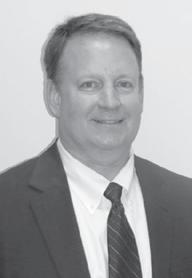
We reverse the denial of pe titioner’s suppression motion. We first find that the patrol of ficer lacked reasonable suspicion to prolong the traffic stop. We note that although the narcot ics officers informed the patrol officer that petitioner seemed suspicious, their suspicions were merely based on a hunch. Although the patrol officer wit nessed other factors such as Jones’ open zipper and her and petitioner’s nervous behavior, we hold that these were not enough to give rise to reason able suspicion in the absence of other evidence of criminal activ ity. We note that the traffic stop was merely a pretext for a drug stop and to obtain consent for a search.
We also reverse the circuit court’s conclusion that petitioner consented to a search. We find that petitioner only placed his hands on the vehicle at the offi cers’ instruction, and thus his be havior could not provide a basis to find consent.
Reversed.
State v. Frasier (Lawyers Weekly No. 010-41-22, 11 pp.) (Kaye G. Hearn, J.) Appealed from Charleston County Circuit Court (Deadra L. Jefferson, J.) Appellate Defender Kathrine Hudgins for petitioner; Attorney General Alan McCrory Wilson and Assistant Attorney General Mark Reynolds Farthing, and Solicitor Scarlett Anne Wilson for respondent. S.C. Sup. Ct.
African-American History Calendar unveiled
The 2023 South Carolina African American History Calendar was un veiled last week during a celebration at the Koger Center for the Arts.
The calendar, first created in 1989, profiles individuals across the state who have had a positive, com pelling affect on South Carolina and beyond.
“The 2023 calendar honorees’ commitment to improving the lives of others through education, health, the arts, advocacy, and public ser vice are remarkable,” S.C. Superin tendent of Education Molly Spear man said in a news release. “Each time readers turn the page to the next month, they will be reminded of the tremendous legacy these hon orees have left to inspire future gen erations.”
The ceremony can be viewed on line at SCAfricanAmerican.com
This year’s calendar profiles 12 honorees, including Midlands
Technical College President Ronald Rhames, WIS-TV anchor Judi Gat son, and 1950s singer and songwrit er Brook Benton. The calendar also features photos and descriptions of artifacts from the International Af rican American Museum, slated to open next year in Charleston.
The 2023 calendar honorees are:
• Thomas Barnwell, a pioneer ing advocate for housing and health care for Hilton Head Island resi dents
Brook Benton, a Camden na tive who scored 23 Top hits in a fiveyear span beginning in 1959
• Bobby Doctor, Civil Rights pio neer and Columbia native
Judi Gatson, anchor of WIS News Live at 5 and WIS News at 6
• Rose Gibbs, the first African American woman to obtain a medi cal degree from MUSC in 1973
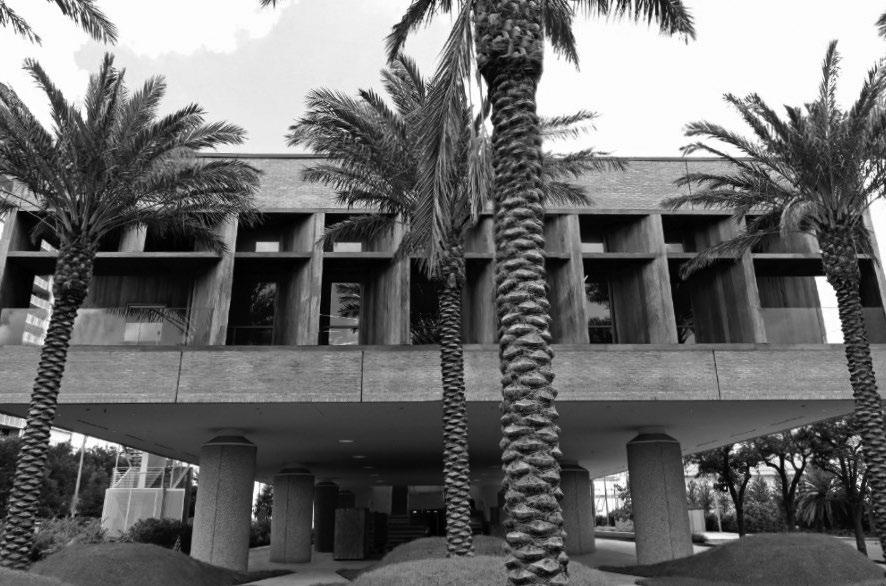
Doris Greene, education and Civil Rights pioneer
• William Jenkins, public health researcher who helped end the Tuskegee Syphilis Experiment
Joseph Rainey, the first African American to serve in the U.S. House of Representatives
• Ronald Rhames, president of Midlands Technical College
The Rollin Sisters, suffragists during the Reconstruction Era
• Donald Sampson, Greenville’s first African American attorney
• Freddie Stowers, Anderson County native and the nation’s only African American WWI soldier awarded the Medal of Honor
More than 25,000 calendars are printed and distributed to schools, faith-based organizations, commu nity centers and the public to high light South Carolina’s rich African American history. The calendar bi ographies are also preserved online and used by S.C. educators.
LAWYER TO LAWYER / Directory
TOM MILLIGAN
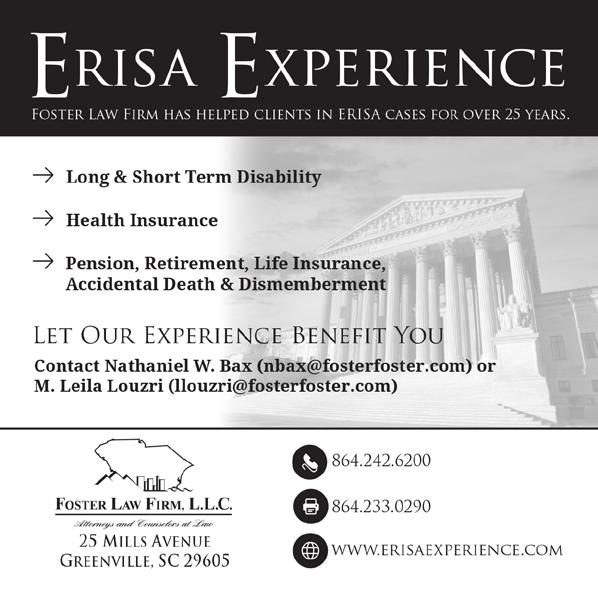
SOUTH CAROLINA LAWYERS WEEKLY I October 10, 2022 NEWS / 11
• OVER 30 YEARS OF EXPERIENCE • TRIAL LAWYER WHO HAS TRIED OVER 200 JURY TRIALS • CERTIFIED ARBITRATOR SINCE 1999 • CERTIFIED MEDIATOR SINCE 2001 MEDIATIONS: PROFESSIONAL CONVENIENT OBJECTIVE MILLIGAN & HERNS, PC 721 Long Point Road, Suite 401 Mt. Pleasant, SC 29464 843-971-6750 ❘ tom@milliganlawfirm.com
Staff report
The International African American Museum, above, which is being recognized with the 2023 African American History Calendar, will open early next year in downtown Charleston. This year’s calendar profiles 12 individuals across the state who have had a positive, compelling effect on South Carolina and beyond . Photo Provided
Continued from 10 ►
ASK OUR CUSTOMERS!


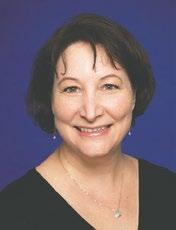
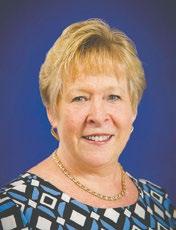






Subsidiary of Investors Title Company (NASDAQ – ticker symbol “ITIC”)984.364.2752 | exchanges@invtitle.com
“Rarely in our business is there truly only one choice in a partner/ relationship. But when it comes to 1031 exchanges, Investors Title is the ONLY option for us.” – Daniel S. Kadis, Centrex Properties, Inc. “Given the added risk associated with reverse exchanges, we have developed a great comfort level over the years working with the Investors Title team. We couldn’t imagine a better partner.” – George T. Barnes, Vanguard Property Group “Not only is the staff very responsive to my calls and emails, they are also very knowledgeable. With representation on the Board of Directors for the Federation of Exchange Accommodators, I know that I can rely on the exchange team for up-to-date advice and guidance on the unusual issues that always seem to come up.” – Donald VonCannon, Esq., Allman Spry Attorneys at Law CAROL HAYDEN, ESQ., CES® EVP ITEC/ITAC chayden@invtitle.com 919.945.2423 VICTORIA TEMPLETON, ESQ., CES® VP ITEC/ITAC Exchange Counsel vtempleton@invtitle.com 919.945.2400 Exclusively dedicated to the 1031 exchange business since 1988 – Investors Title Exchange Corporation provides exemplary qualified intermediary and exchange accommodation title holder services. u hundreds of exchanges facilitated every year u administered by a knowledgeable, experienced team of exchange attorneys and exchange specialists u transactional integrity ensured via • safety of funds through Fidelity bonding, strict internal controls, and independent audits • interest-bearing exchange accounts • fast, dependable service and document preparation 1031 EXCHANGE EXPERTISE DEDICATED EXCHANGE TEAM. EXCEPTIONAL SERVICE. Investors Title Exchange & Accommodation F-72 (3/2021) | GENP8520210301































